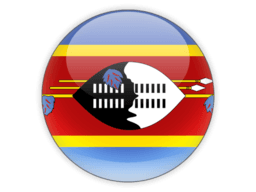
Regions of Eswatini
Explore 4 regions
Cities of Eswatini
Discover 9 cities across 4 regions
Lubombo Region(2)
Manzini Region(2)
Shiselweni(2)
Eswatini, formerly known as Swaziland, is a landlocked country located in Southern Africa. It is bordered by South Africa to the west, north and south, and Mozambique to the east. Eswatini has a population of approximately 1.1 million people, and its capital and largest city is Mbabane.
Eswatini is known for its rich cultural heritage, which is evident in its traditional dances, music, arts, and crafts. The country has a strong monarchy, and the king is highly revered by the people. The official languages of Eswatini are English and siSwati.
Eswatini's economy is largely based on agriculture, with the majority of the population engaged in subsistence farming. Crops grown include maize, sorghum, cotton, sugar cane, and tobacco. The country also has significant mineral resources, including coal, diamonds, and gold. Eswatini is a member of the Southern African Customs Union (SACU) and the Common Market for Eastern and Southern Africa (COMESA).
Despite its natural beauty and rich cultural heritage, Eswatini faces a number of challenges, including poverty, high HIV/AIDS rates, and a lack of economic diversification. The government has been working to address these issues through various programs, including poverty reduction initiatives and efforts to attract foreign investment.
Telephone Code
268
Local Emergency Phone
Local numbers only
Vaccinations
An International Certificate of Vaccination for yellow fever is required for travelers arriving from countries with a risk of yellow fever transmission and for travelers having transited through the airport of a country with risk of yellow fever transmission. See WHO recommendations.
Climate
Varies from tropical to near temperate
Currency (Code)
Emalangeni (SZL)
Electricity/Voltage/Plug Type(s)
230 V / 50 Hz / plug types(s): M
Major Languages
English (used for government business), siSwati
Major Religions
Christian 90% (Zionist - 40%, Roman Catholic 20%, other 30% - includes Anglican, Methodist, Mormon, Jehovah's Witness), Muslim 2%
Potable Water
Opt for bottled water
International Driving Permit
Suggested
Road Driving Side
Left
Tourist Destinations
Hlane Royal National Park; Mbuluzi Game Reserve; Mlawula Nature Reserve; Mlilwane Wildlife Sanctuary; Malolotja Nature Reserve, Phophonyane Falls Nature Reserve
Major Sports
Soccer, rugby, cricket
Cultural Practices
If sitting on the ground, it is considered very rude to point one's feet at another person.
Tipping Guidelines
Service charges are not normally included in bills, but tips of 10% are customary.
Souvenirs
Woven rugs, clay pots, sisal woven baskets, traditional dyed cloth or hand-loomed mohair items, glass-bead or precious-metal jewelry, carved wooden statues, sheet-metal toys
Traditional Cuisine
Karoo roast ostrich steak — thinly sliced ostrich steaks marinated in red wine and juniper berries with salt and pepper then fried in butter and served with onions sautéed with peppercorns, white wine, and heavy cream; traditionally accompanied with a pumpkin and ground maize mash
Geography
Area
total: 17,364 sq km
land: 17,204 sq km
water: 160 sq km
Climate
varies from tropical to near temperate
Natural resources
asbestos, coal, clay, cassiterite, hydropower, forests, small gold and diamond deposits, quarry stone, and talc
People and Society
Population
1,130,043 (2023 est.)
Ethnic groups
predominantly Swazi; smaller populations of other African ethnic groups, including the Zulu, as well as people of European ancestry
Languages
English (official, used for government business), siSwati (official)
Religions
Christian 90% (Zionist - a blend of Christianity and indigenous ancestral worship - 40%, Roman Catholic 20%, other 30% - includes Anglican, Methodist, Church of Jesus Christ, Jehovah's Witness), Muslim 2%, other 8% (includes Baha'i, Buddhist, Hindu, indigenous, Jewish) (2015 est.)
Population growth rate
0.72% (2023 est.)
Government
Government type
absolute monarchy
Capital
name: Mbabane (administrative capital); Lobamba (royal and legislative capital)
Economy
Economic overview
landlocked southern African economy; South African trade dependent and currency pegging; CMA and SACU member state; COVID-19 economic slowdown; growing utilities inflation; persistent poverty and unemployment; HIV/AIDS labor force disruptions
Real GDP (purchasing power parity)
$10.56 billion (2021 est.)
Real GDP per capita
$8,900 (2021 est.)
Agricultural products
sugar cane, maize, roots/tubers nes, grapefruit, oranges, milk, beef, potatoes, vegetables, bananas
Industries
soft drink concentrates, coal, forestry, sugar processing, textiles, and apparel
Exports
$2.132 billion (2021 est.)
Exports - partners
South Africa 94% (2017)
Exports - commodities
soft drink concentrates, sugar, timber, cotton yarn, refrigerators, citrus, and canned fruit
Imports
$2.173 billion (2021 est.)
Imports - partners
South Africa 81.6%, China 5.2% (2017)
Imports - commodities
motor vehicles, machinery, transport equipment, foodstuffs, petroleum products, chemicals
International Airports in Eswatini
Discover 1 major airports serving Eswatini
Mark Eswatini as Visited
Add Eswatini to your personal travel map and track your journey around the world. Share your adventures and see your progress grow!